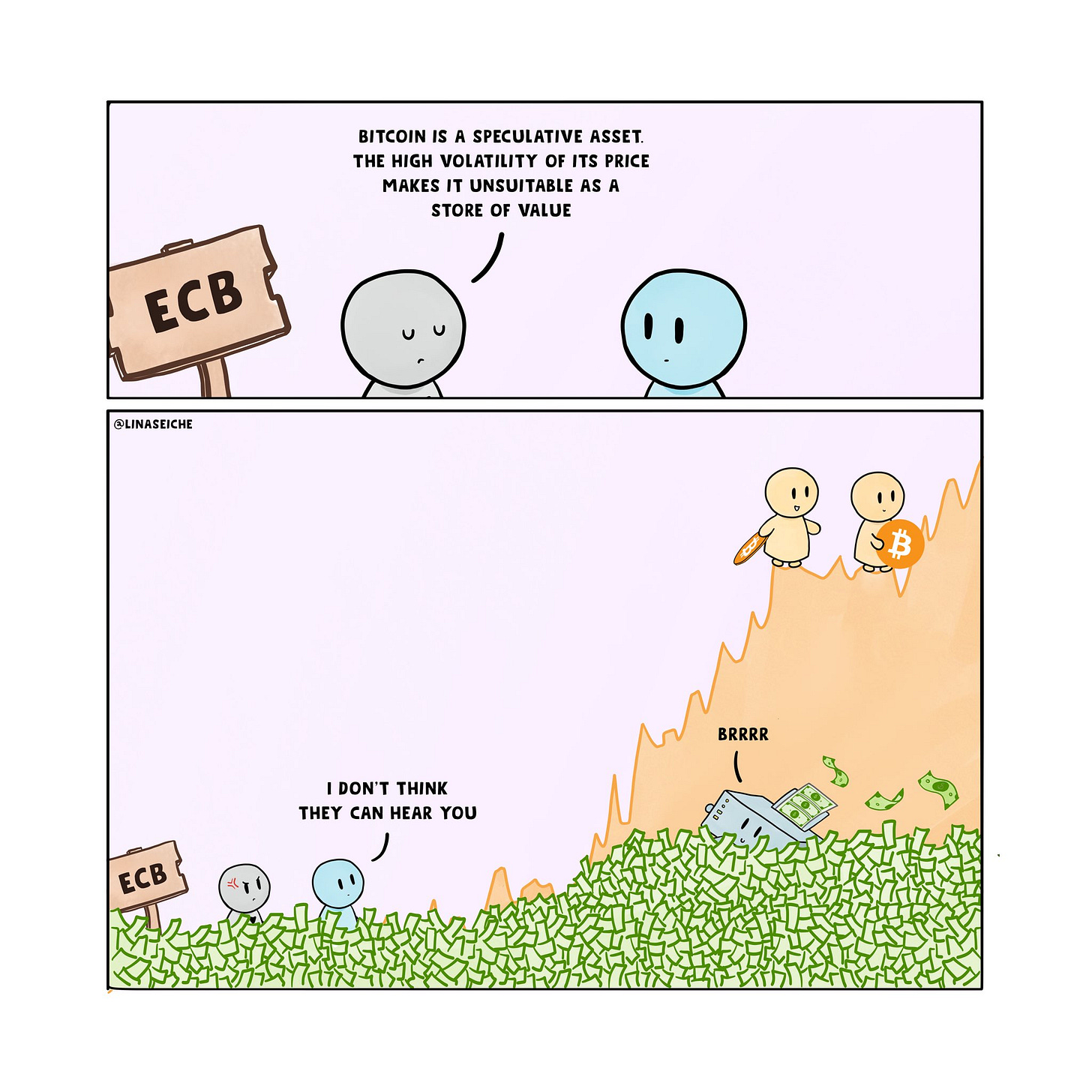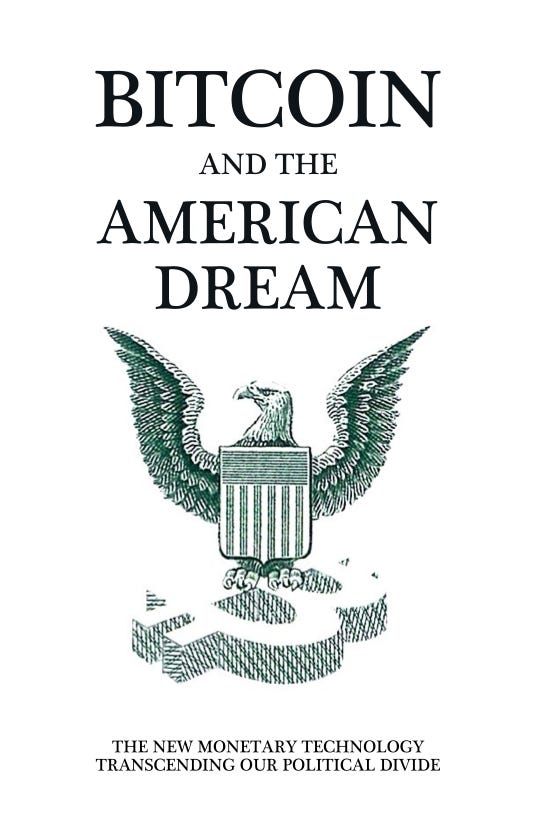NFTs and DeFi on Bitcoin. Bitcoin Tech Talk #279
NFTs and DeFi have had their hype during this cycle and of course, there’s always the question that people will ask. Can we get X on Bitcoin? It’s usually an argument from well-meaning Bitcoin enthusiasts who want to argue against the case for some other coin that’s been able to get a lot of marketing buzz through the introduction of said thing.
It’s easy to argue that such a thing is technically possible. Certainly, you could do something like a non-fungible token and collateralized lending as an excuse for issuing new tokens on Bitcoin. It probably would surprise people to know that both were possible on BTC back in 2013.. Yet, technical feasibility is missing the point. There’s a reason why these products aren’t on Bitcoin and that’s what I’m writing about today.
Each bull cycle there’s some hype around something or other and putting the hyped thing on Bitcoin is the “compromise” that many in Bitcoin look to. During the altcoin boom of 2013, features of various altcoins were things people were asking to put on Bitcoin. In 2017, ICOs received similar treatment by some, as were gaming assets in 2018 and so on. Each time, the technical question of whether it’s possible on Bitcoin was touted as the definitive argument against altcoins.
Technical feasibility is ceding too much ground. That’s conceding that these products have some use case. Altcoins, including the newest versions, NFTs and DeFi tokens, have no real use other than to enrich the people who issued the tokens. The battle should be fought at the level of concept, not at the level of technical feasibility. Yes, technically, all of these things are possible, but adding technical features to allow for these things would be legitimitizing them. The fact is that all of these “innovations” require some sort of token issuance or money printing by a central authority. They are by nature centralized and the trust inherent in centralization is what’s abused for the profit of those in control. In other words, they’re scams.
These products are highly dependent on marketing and very little on technology. The tech is copied all the time. What’s instructive is that the same exact technology does substantially worse because it doesn’t have the same marketing. Ethereum Classic is the same as Ethereum technically, yet all these tokens launch on ETH, not ETC. It was never about the technology.
This is why arguing for technical feasibility on Bitcoin is missing the point. The game they’re playing is one of hype and marketing and that’s not a game won by the most features. Instead, it’s a game won by marketing, hype and massive monetary support in the form of “investment” by VCs. They’re monetary status games much in the same way that fiat currencies are. Copying the technology and structure of the European Central Bank by an African country wouldn’t suddenly make them as powerful. The country’s reputation matters in a centralized system and that’s why copying the code doesn’t automatically give you the same value. In other words, money is valued very differently than technology.
And this is the real perniciousness of this weird game that all altcoins play. They’re competing for mindshare which allows them to impose a certain reality through their centralized tokens. If that sounds familiar, it should. It’s the same game that central banks are playing right now on the global stage. In this monetary status game, whoever is most convincing wins… temporarily. Who wins has little to do with technology and a lot more to do with power, marketing, fashion, and luck. They all compete on the centralized monetary trust. Whichever centralized entity gets the most trust from the market wins.
Bitcoin, for that reason, doesn’t compete with all these other coins. Its value is based on its ability to not change. It’s not a central committee that’s trying to gain trust from the public, it’s computer code that proves its trustworthiness by running and being verified by the public every ten minutes. Bitcoin is decentralized. Decentralized verification is its source of truth and not the trustworthiness of some central committee. Bitcoin competes as decentralized money. It’s a very different animal than the centralized monetary trust game that the other coins are playing.
Altcoins, including NFTs and DeFi and whatever, are always trading on future promises and fluctuate in value based on the perceived trustworthiness of the central controllers. This is similar to how FX markets operate, which is based on the perception of the actions of the various central banks that control them. They’re both truly wasteful games that produces little of value and incentivizes rent-seeking.
This is the game that Bitcoin is trying to upend. The current monetary system is wasteful for the same reasons that altcoins are. The centralized altcoin games encourage all manner of rent-seeking instead of real production. We don’t want Bitcoin to play that game, because Bitcoin is competing to be better money on the basis of decentralization. This is why Bitcoin doesn’t need or want “hype” in the form of these features. Let the centralized things compete in their shrinking market. Bitcoin will eat their lunch by competing at another level.
Bitcoin
Gloria Zhao describes what Replace-by-Fee (RBF) is and the problems associated with it. The main problems are related to pinning attacks, which essentially “pin” transactions in a mempool and don’t allow replacement due to certain limitations with the default Core RBF policy. It turns out that doing an RBF transaction to bump the fee rate is quite difficult as it’s not entirely clear whether the RBF will succeed replacing the transaction in the mempool a lot of times. She goes through the various ways in which some of the identified problems can be solved and there’s an ongoing discussion on the Bitcoin-dev list about these ideas. Given the importance of being able to get certain transactions in, especially for Lightning, this is an important consideration for future Bitcoin development.
BitFinex examines address reuse as part of the network. The report, frankly, isn’t great. There is quite a lot of address reuse and it only seems to be growing. They speculate that this is mostly exchanges, who have no concerns about privacy. This is probably correct given that the deposit transactions are often reusing the same addresses to make database queries easier and faster. They’ve indicated that they’ll look into more detail in the coming weeks.
A recent paper looks at the code changes that altcoins that forked from Bitcoin have made. The researchers examined 592 code bases of code forks of Bitcoin and found that 80% had at least one major security vulnerability that wasn’t patched and half of the 20 very closely examined code did not make a single meaningful code change. Even the security patches that did flow down from Bitcoin Core took an average of 238 days for altcoin devs to implement. In other words, there’s hard evidence that altcoins are made not to innovate, but to enrich their founders.
Lightning
Marty Bent is forking Ghost to add Lightning paywalls! Ghost is a self-hosted platform for blogs, newsletters and other content, so this is a pretty good match. Given that many Lightning node operators already have servers set up, adding Ghost to Umbrel/Start9/MyNodeBTC shouldn’t be too difficult once this product is shipping. There are plenty of people that would like to run their own server and adding Lightning paywalls allows for much easier monetization than something like ads. I can’t wait to see what people come up with when this goes live.
CashApp now allows you to transfer via Lightning. With this, they’re joining the exchanges that have implemented Lightning. They join Strike, River and BitFinex as the exchanges that have Lightning integration. Generally, what we’re seeing in the market is that exchanges are now bifurcating into Bitcoin exchanges and altcoin exchanges. The Bitcoin ones seem much more eager to add lightning and altcoins, more altcoins. We’ll see which is the better long-term play.
Sensei is a lightning implementation built with BDK and LDK from Spiral (formerly Square Crypto). They’re billed as a “Lightning Node for Everyone” suggesting that it’s easier to use and has better UI than other implementations. What’s particularly interesting about this implementation is that it has the concept of child nodes. That is, nodes that are lightweight because they use the parent’s resources. The main idea being that one person can run the full lightning node while others (say, a relative or friend) can run a child node off the same resources. It’s a great concept and I hope places like El Zonte take a look.
Economics, Engineering, Etc.
Ten31 explains why they’re so bullish on open-source software. The article is a nice long-read on the benefits of open-source, the business case for investing in open-source companies and why the ethos aligns with Bitcoin. It’s easy for me to forget as a programmer that most people don’t understand what open-source software is, let alone why it’s important. Much like Bitcoin, the benefits of open-source are enormous, even if it’s not obvious at first.
Apparently, the BitFinex hack coins moving was done by the government as they are alleging that a husband and wife couple hacked them. What’s surprising is that they apparently kept the keys on a cloud server and the government was able to recover the coins now worth billions of dollars. Court documents show that there’s an additional $300M that they haven’t recovered, which are probably in off-line wallets.
Canadian Truckers are bringing a lot of publicity to Bitcoin. With GoFundMe refusing to disperse money to them and Canadian banks essentially seizing funds meant for them, Bitcoin is showing that it’s a decentralized system capable of transferring large amounts peer-to-peer. What’s more, no altcoin would be capable of pulling this off. They all lack liquidity and/or have political pressure points (aka single points of failure) which make them incapable of doing something like this.
A pseudonymous post shows what the Cantillon effect is and how Bitcoin fixes it. For people that aren’t versed in Austrian economics, this is a foreign concept and one that needs careful explanation. The post does a good job of explaining what it is and how it benefits certain people. As the article points out, Bill Gates’ buying of significant tracts of real estate is likely a way to capitalize off of the significant money printing. This article is recommended for people that don’t really understand the evils of central banking.
Guardian profiles a Norwegian mining operation that runs on clean energy and uses excess heat to dry wood. This is, of course, counter to the ESG narrative, but that’s not the only reason to applaud the company. The excess heat usage is a good thing and I expect more mining companies to use it productively. Mining is currently too profitable to optimize excess heat, but this will be an important part of the ecosystem as mining competition enters the market. Someone will figure out the most profitable use of the excess heat and will be handsomely rewarded.
Quick Hits
There’s a much easier way to browse BIPS using this website.
Seriously, stop asking about quantum. You should worry instead about dolphins.
BlockFi is settling with the SEC for a cool $100M.
Finally, an honest altcoin.
Another week, another altcoin exchange shuts down.
Another week, another huge exploit on an altcoin, though apparently caught in time.
Events
I am in London for Advancing Bitcoin March 3-4. I am also going to be at Bitcoin 2022 in Miami April 6-8.
I’ll also be doing the Programming Blockchain seminars in London March 1-2 and Miami April 4-5.
Podcasts, Etc.
On this week’s Bitcoin Fixes This, I talked to Chris Slaughter about Bitcoin Banking. He’s creating services so that people in the US can really live on a Bitcoin Standard.
I read through last week’s newsletter which you can find here. My talk with Ted Cruz during the Texas Blockchain Summit is up.
Here is the latest book which is out now!
My other books are here and here.
Unchained Capital is a sponsor of this newsletter. I am an advisor and proud to be a part of a company that’s enhancing security for Bitcoin holders. If you need multisig, collaborative custody or bitcoin native financial services, learn more here.
Fiat delenda est.










